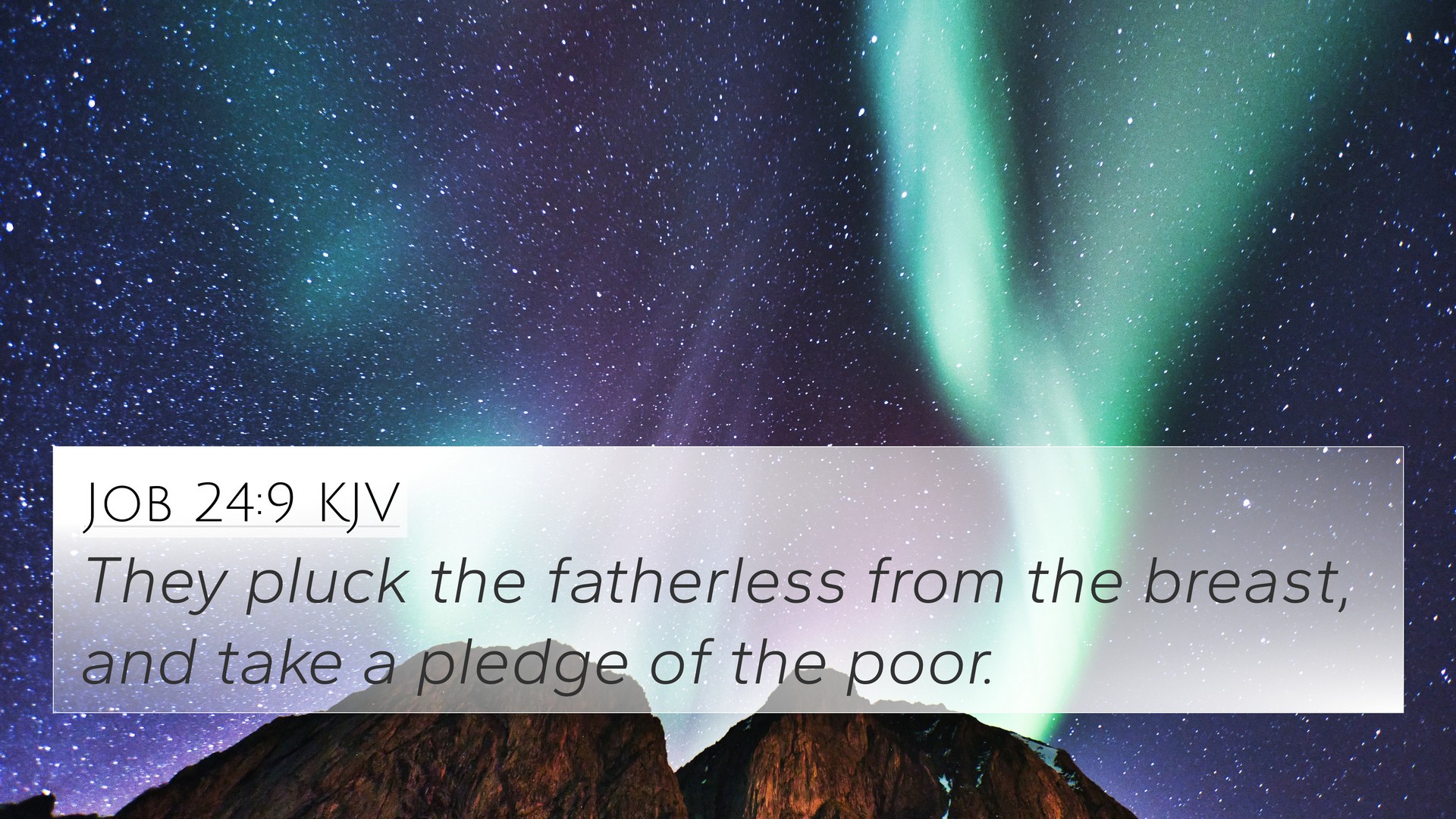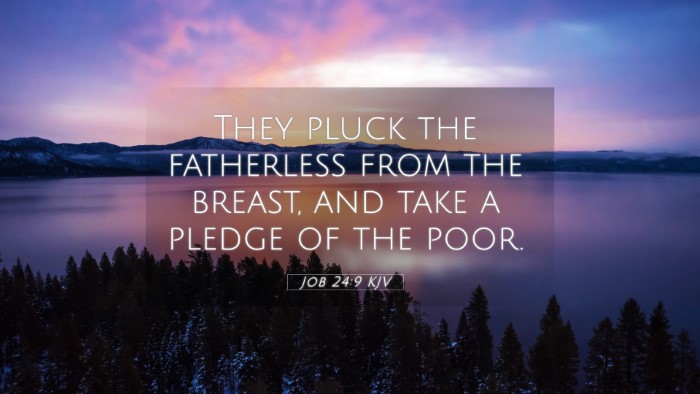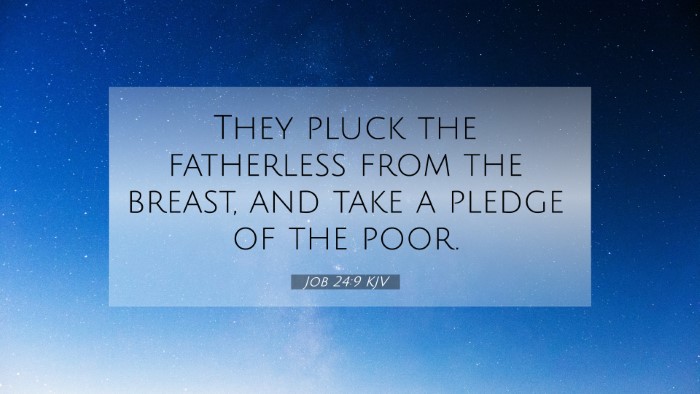Old Testament
Genesis Exodus Leviticus Numbers Deuteronomy Joshua Judges Ruth 1 Samuel 2 Samuel 1 Kings 2 Kings 1 Chronicles 2 Chronicles Ezra Nehemiah Esther Job Psalms Proverbs Ecclesiastes Song of Solomon Isaiah Jeremiah Lamentations Ezekiel Daniel Hosea Joel Amos Obadiah Jonah Micah Nahum Habakkuk Zephaniah Haggai Zechariah MalachiJob 24:9 Similar Verses
Job 24:9 Cross References
They pluck the fatherless from the breast, and take a pledge of the poor.
Uncover the Rich Themes and Topics of This Bible Verse
Listed below are the Bible themes associated with Job 24:9. We invite you to explore each theme to gain deeper insights into the Scriptures.
Job 24:9 Cross Reference Verses
This section features a detailed cross-reference designed to enrich your understanding of the Scriptures. Below, you will find carefully selected verses that echo the themes and teachings related to Job 24:9 KJV. Click on any image to explore detailed analyses of related Bible verses and uncover deeper theological insights.
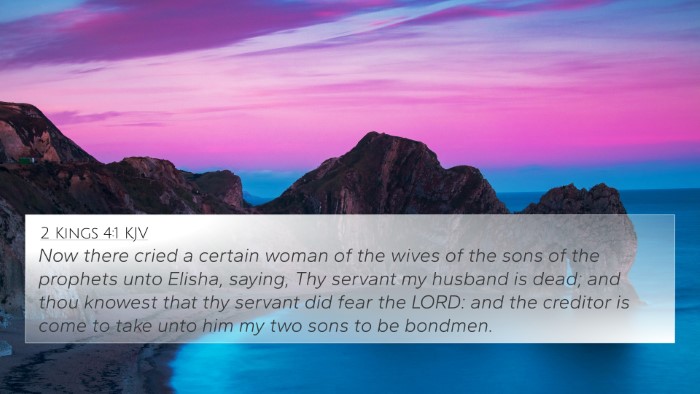
2 Kings 4:1 (KJV) »
Now there cried a certain woman of the wives of the sons of the prophets unto Elisha, saying, Thy servant my husband is dead; and thou knowest that thy servant did fear the LORD: and the creditor is come to take unto him my two sons to be bondmen.
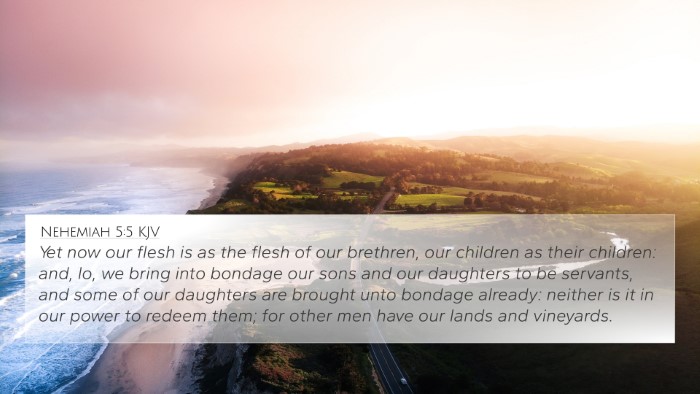
Nehemiah 5:5 (KJV) »
Yet now our flesh is as the flesh of our brethren, our children as their children: and, lo, we bring into bondage our sons and our daughters to be servants, and some of our daughters are brought unto bondage already: neither is it in our power to redeem them; for other men have our lands and vineyards.
Job 24:9 Verse Analysis and Similar Verses
Understanding Job 24:9
Job 24:9 states, "They pluck off the fatherless from the breast, and take a pledge of the poor." This verse highlights the plight of the vulnerable in society, specifically focusing on orphans and the poor. The statement captures the essence of injustice and exploitation faced by the most defenseless individuals.
Verse Meaning and Interpretation
The meaning of this verse elicits a profound consideration of social justice from various public domain commentaries. Let’s delve into the insights from prominent commentators like Matthew Henry, Albert Barnes, and Adam Clarke.
- Matthew Henry: Henry remarks on the horrific actions of those who would take advantage of the helpless, likening it to a violation of natural affections. He suggests that this reflects the moral decay in society where exploitation prevails.
- Albert Barnes: Barnes emphasizes the emotional impact of this situation. He indicates that the imagery of plucking a child from the breast of their mother reveals a deep sense of cruelty and neglect towards the innocent and impoverished.
- Adam Clarke: Clarke discusses the implications of taking a pledge from the poor, indicating that such actions are not merely material but symbolize a betrayal of trust and a lack of compassion that should govern human relations.
Connections to Other Biblical Texts
Job 24:9 can be cross-referenced with several Bible verses that resonate with its themes of injustice and the treatment of the vulnerable:
- Exodus 22:22-24: "You shall not mistreat any widow or fatherless child." This highlights God's command against exploiting the helpless.
- Psalms 68:5: "A father to the fatherless, a defender of widows, is God in his holy dwelling." This verse underscores God's care for orphans and the oppressed.
- Psalms 146:9: "The LORD watches over the sojourners; he upholds the widow and the fatherless." Again, emphasizing divine attention on the downtrodden.
- James 1:27: "Religion that God our Father accepts as pure and faultless is this: to look after orphans and widows in their distress." This New Testament verse encourages believers to care for the marginalized.
- Proverbs 22:22-23: "Do not rob the poor because they are poor, or crush the afflicted at the gate." This offers divine perspective on maintaining justice for the impoverished.
- Isaiah 1:17: "Learn to do good; seek justice, correct oppression." This summons believers to actively pursue justice and protect the vulnerable.
- Luke 6:20: "Blessed are you who are poor, for yours is the kingdom of God." It reveals the blessedness associated with those in lowly conditions.
Thematic Bible Verse Connections
There is a significant thematic unity in the scriptures that speak about justice, compassion, and the societal responsibility towards those in need. Several key themes can be identified:
- Justice for the Oppressed: Throughout the Bible, there is a recurring call for justice (Jeremiah 22:3, Micah 6:8).
- Compassion and Care: Many verses highlight the importance of showing compassion to the poor and marginalized (Proverbs 19:17).
- Divine Justice: The notion that God sees the injustice done to the vulnerable is pervasive (Psalm 9:18).
Tools and Methods for Cross-Referencing
Understanding connections between Bible verses can be enhanced through various tools and methods:
- Bible Concordances: These reference books help locate verses by keywords and phrases.
- Bible Cross-Reference Guides: These tools provide an organized way to find related verses.
- Online Bible Reference Resources: Websites dedicated to scripture analysis can provide thorough insights.
- Bible Study Groups: Engaging with others can lead to new understandings through discussion and comparison.
- Bible Study Software: Programs that allow for comprehensive cross-referencing and thematic exploration.
Conclusion
Job 24:9 encapsulates critical issues around justice for the vulnerable and challenges readers to consider their roles in addressing societal inequities. Through various commentaries and connections across the scripture, we can gain a deeper appreciation of the Biblical mandate to protect the defenseless and uphold justice. The reflections drawn from Job 24:9 remain relevant to our lives today, urging us to connect our faith with action and compassion.
